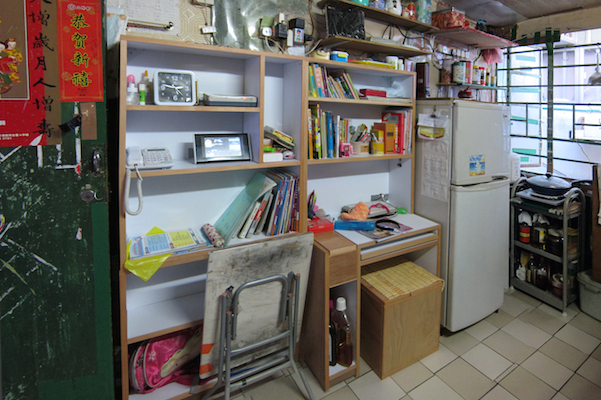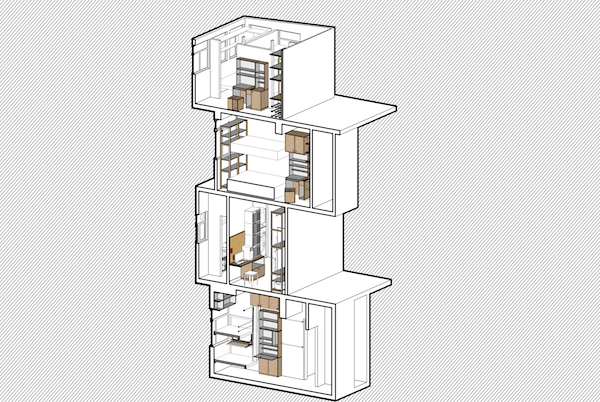The not-for-profit design practice caters to Hong Kong and China communities that would not normally have access to architectural services. Marta Catalan Eraso reports.

July 27th, 2016
All images courtesy of DOMAT
Hong Kong stands out as a wealthy, successful business hub, and yet 1.3 million people live in poverty, according to the government reports. That’s 15 percent of the population that is not so visible, especially in terms of their domestic spaces. Maggie Ma and Mark Kingsley had this portion of the population in mind when they established DOMAT, a non-profit architectural practice, in Hong Kong.
Ma and Kingsley’s mission is to improve living conditions for these people. For families in poverty in Hong Kong often dwell in tenement buildings, living in transition while waiting to be allocated to public housing. One family of four can even share a single room of 100 square feet within a subdivided flat. Owing to the lack of space, these tiny domestic spaces change throughout the day to accommodate different functions.
DOMAT targets this group of the population, aiming to improve their living conditions. This required careful thought, because renovating dilapidated housing could be counterintuitive, leading landlords to ultimately increase rents. Inspired by the high mobility this population group demonstrates, and spurred by the dynamic way these families operate within their homes, DOMAT decided that the best way to help was by producing furniture.

The same tenement space, considerably improved thanks to DOMAT’s furniture
This furniture project was initiated by the Society for Community Organisation (SoCO), with sponsorship from South China Morning Post, donations from agnès b. and Sino Group, and support from CLP Power Hong Kong Limited. The resulting collection makes use of the high ceilings in tenement housing, with storage higher up and space closer to the floor, to create dedicated study spaces for children.
The furniture is based on a standardised design made from block wood; it is structured so that families can easily disassemble and reassemble the furniture themselves as they move into new housing. As well as helping local families in need, the furniture also contributes to the local economy in that it’s produced in Hong Kong, by local contractors – and at a low cost.

DOMAT’s vision for how its furniture will be used by lower-income families
Alongside designing furniture, DOMAT is involved with other social projects that engage with and resolve issues common to local communities. Open-air waste disposal is one such problem that is common in villages in Hong Kong and China, with garbage dumped in or beside rivers and streams, or burned, thus creating air pollution problems. To overcome this problem, DOMAT set up a Waste & Recycling Collection Point in Wanmeibo Village, Baojing County, Hunan Province, China.
The Institute for Integrated Rural Development, Hong Kong, initiated this project, with donations from the Fu Tak Iam Foundation. DOMAT created a collection point with separate chambers for waste and recycling, sloping floors for increased hygiene, vertical stacking for a reduced footprint and clear routes in order to make waste disposal more fun. The aim here is to encourage children to participate in the process of waste collection and to raise awareness of consumption consequences.
Architecture should not only be about creating beauty; it should also have a social role and contribute to improving the social conditions of all strata of society. The simple yet functional and economic designs DOMAT produces demonstrate that you don’t have to spend big bucks in order to create valuable and inclusive design.
DOMAT
domat.hk
A searchable and comprehensive guide for specifying leading products and their suppliers
Keep up to date with the latest and greatest from our industry BFF's!

Suitable for applications ranging from schools and retail outlets to computer rooms and X-ray suites, Palettone comes in two varieties and a choice of more than fifty colours.

Create a configuration to suit your needs with this curved collection.

Sub-Zero and Wolf’s prestigious Kitchen Design Contest (KDC) has celebrated the very best in kitchen innovation and aesthetics for three decades now. Recognising premier kitchen design professionals from around the globe, the KDC facilitates innovation, style and functionality that pushes boundaries.

In the pursuit of an uplifting synergy between the inner world and the surrounding environment, internationally acclaimed Interior Architect and Designer Lorena Gaxiola transform the vibration of the auspicious number ‘8’ into mesmerising artistry alongside the Feltex design team, brought to you by GH Commercial.
The internet never sleeps! Here's the stuff you might have missed

Swiss home appliance designer and manufacturer V-ZUG’s first Sydney studio is a unified expression of the brand’s boutique, sustainable and design-led identity.

In our series spotlighting aficionados across the design industry, we spoke with Alexandra Guglielmino, who leads the Art Advisory team at Bluethumb Art Gallery.